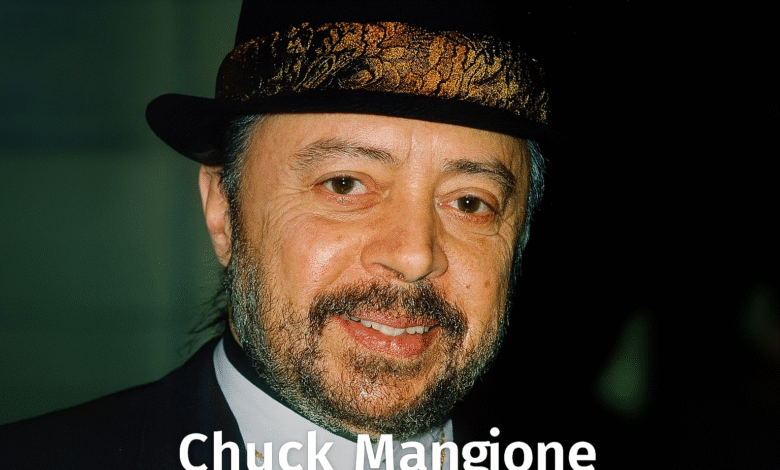Chuck Mangione: The Jazz Maestro Who Made the Flugelhorn Sing
Exploring the Life, Legacy, and Timeless Impact of a Smooth Jazz Icon

Introduction
Chuck Mangione is a celebrated American jazz musician whose distinctive flugelhorn sound has enchanted audiences for decades. Rising to prominence in the 1970s with his crossover hit Feels So Good, Mangione brought a unique blend of jazz, pop, and orchestral music into the mainstream. His ability to craft emotionally rich, melodic compositions earned him not only commercial success but also critical acclaim, including Grammy Awards and international recognition. His music became a soundtrack for both intimate moments and grand events, including the Olympic Games.
Born in Rochester, New York, Chuck’s musical journey began at an early age, nurtured in a family that valued creativity and collaboration. A graduate of the Eastman School of Music, he fused formal education with raw talent to create a sound that transcended genre. Over the years, Mangione’s contributions went far beyond the stage; he became a symbol of accessible jazz and an enduring figure in American music history. His story is not only about musical brilliance but also about breaking boundaries and inspiring generations.
Quick Bio
| Attribute | Detail |
|---|---|
| Full Name | Charles Frank Mangione |
| Date of Birth | November 29, 1940 |
| Age | 84 (as of 2025) |
| Birthplace | Rochester, New York, USA |
| Nationality | American |
| Ethnicity | Italian American |
| Accent | Standard American English |
| Education | Eastman School of Music |
| Primary Instrument | Flugelhorn |
| Genres | Jazz, Smooth Jazz, Jazz Fusion |
| Spouses | Judi Mangione (earlier), Rosemarie (later) |
| Children | Two daughters (Diana, Nancy Lee) |
| Known For | “Feels So Good”, Olympic Themes |
A Childhood Filled with Melody
Born into an Italian-American family in Rochester, New York, Chuck Mangione was immersed in music from a young age. His household welcomed legendary musicians for informal jam sessions, exposing young Chuck to jazz legends like Dizzy Gillespie, who later gifted him a flugelhorn. His natural talent for the trumpet blossomed by the age of ten, forming a firm foundation for a lifelong career in music.
Growing up alongside his equally gifted brother Gap Mangione, Chuck’s early musical experiences were steeped in collaboration. He began playing piano at eight and trumpet shortly after, laying the groundwork for his distinct melodic style that would later define his jazz legacy.
Academic Journey and Professional Formation
Education at Eastman School of Music
Chuck pursued formal education at the prestigious Eastman School of Music from 1958 to 1963. There, he honed his compositional skills and mastered the trumpet and flugelhorn. His classical training gave his jazz compositions a structured yet emotive quality, making his work both accessible and technically refined.
During his university years, Chuck co-founded the group The Jazz Brothers with Gap. The group gained recognition by releasing several albums on the Riverside label, setting the stage for Chuck’s transition into the larger jazz scene.
Breakthrough and Rise to Stardom
Joining the Jazz Elite
After college, Chuck joined Art Blakey’s Jazz Messengers from 1965 to 1968. This period was instrumental in shaping his performance style, as he shared the stage with some of the most innovative jazz musicians of the era. His flugelhorn solos added a lyrical depth to the group’s hard bop energy.
By the early 1970s, Chuck transitioned to a solo career and signed with Mercury Records. His live album Friends & Love featured the Rochester Philharmonic and was a turning point, blending orchestral arrangements with jazz improvisation—a formula that became his signature.
Signature Hits and Career Highlights
“Feels So Good” and Grammy Success
Chuck Mangione’s most iconic composition, Feels So Good (1977), catapulted him into mainstream success. The single reached No. 4 on the Billboard Hot 100 and became an enduring classic. Its infectious melody made it one of the most recognizable instrumental tracks in popular music.
In 1976, he won his first Grammy for “Bellavia” in the Best Instrumental Composition category. Two years later, he received another Grammy for Children of Sanchez, which showcased his versatility and emotive range. These accolades cemented his status as a jazz innovator with mass appeal.
Olympic Themes and Global Reach
Soundtrack to the Games
Chuck’s ability to craft uplifting, grand compositions led to his involvement with the Olympics. His piece Chase the Clouds Away was used in the 1976 Montreal Games, while Give It All You Got became the theme for the 1980 Winter Olympics in Lake Placid. The latter reached No. 1 on the Adult Contemporary chart and further expanded his global fanbase.
These compositions reflected Mangione’s gift for blending optimism, rhythm, and emotion, making him a favourite for both radio listeners and international audiences.
Later Years and Continued Influence
Media Appearances and Retirement
In the 1990s and 2000s, Chuck’s presence extended into popular culture. He voiced a recurring character version of himself on King of the Hill (1997–2009), always humorously breaking into Feels So Good. He also appeared on shows like Magnum, P.I. and participated in musical tributes and education initiatives.
Though he slowed down touring in the 2010s, Mangione remained musically active into his seventies. He influenced a new generation of smooth jazz artists and flugelhorn players who admired his emotional clarity and melodic storytelling.
Net Worth, Salary and Income Sources
Financial Snapshot
Chuck Mangione’s net worth is estimated at $10 million as of 2025. His primary sources of income included album sales, live performances, sync licensing, and royalties. In 2024, his entire publishing catalog was acquired by Primary Wave, ensuring his compositions continue generating revenue through licensing for media and advertising.
His long-term success stems not just from hit singles, but also from consistent licensing opportunities, educational engagements, and collaborations.
Family and Personal Life
A Private Household
Chuck Mangione married Judi in the 1960s, and they had two daughters: Diana Mangione and Nancy Lee Piraino. Later, he married Rosemarie, who was referred to as his “third wife” in a 1998 article. Chuck has kept much of his private life away from the spotlight, focusing public attention on his music.
His family continues to support and celebrate his legacy, and his daughters are occasionally mentioned in media tributes and concert notes.
Latest News and Legacy
Catalog Deal and Tributes
In 2024, Chuck Mangione’s publishing rights were acquired by Primary Wave, signaling a new era of music marketing for his work. This includes strategic licensing to streaming platforms, film and TV, and advertising, ensuring continued relevance.
He was also honoured in a 2025 tribute album by jazz guitarist Coleman Mellett, reaffirming his lasting influence on contemporary musicians.
FAQ: Frequently Asked Questions
1. What instrument is Chuck Mangione famous for?
Chuck is best known for playing the flugelhorn, which became his signature sound across jazz and pop music.
2. What is Chuck Mangione’s most popular song?
His most famous track is Feels So Good, a 1977 hit that remains one of the most iconic instrumental pieces in modern jazz.
3. Has Chuck Mangione won any awards?
Yes, he has won two Grammy Awards for “Bellavia” and Children of Sanchez, and was nominated multiple times throughout the 1970s and 1980s.
4. Is Chuck Mangione still alive?
As of 2025, Chuck Mangione is alive and retired from active performing, but his music remains widely celebrated.
5. What’s the latest update on Chuck Mangione’s music?
In 2024, Primary Wave acquired his full catalog to promote licensing, streaming, and broader distribution of his classic works.
Conclusion:
Chuck Mangione’s contributions to jazz are timeless. From his poetic flugelhorn melodies to Olympic anthems and Grammy-winning performances, his influence is deep and widespread. With renewed focus on his catalog and a legacy embedded in popular culture, Mangione’s music continues to inspire and uplift across generations.



